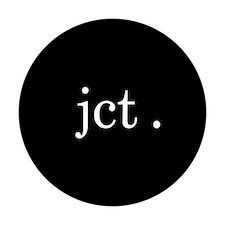By Molly Papows
New Hampshire and Vermont share an active literary landscape, but it hasn’t always been easy for area book lovers to know where to look. In 2016, Shari Altman and Rebecca Siegel took matters into their own hands and founded Literary North as an events calendar, but that was only the beginning. They've since built up a robust website and newsletter, co-sponsored local book releases, launched their own series of events, hosted book clubs, and, as of 2019, realized their dream of publishing Literary North's own handmade chapbook series, the Little Dippers. This spring alone they created an online community writing project, hosted multiple virtual events, organized a four-session remote writing workshop, and continued their tireless work as advocates for New England's literary community as writers, scholars, publishers, and bookstores navigate the industry-wide impact of a global pandemic.
"I point my graduate students to the Literary North website so that they can see the full scope of the scene in the Upper Valley," wrote Rena Mosteirin, Literary North's first published author and a lecturer in Dartmouth's Master of Arts in Liberal Studies program. "Rebecca and Shari use Literary North to shine a light on the local literary scene and also as a showcase for emerging writers."
Rebecca and Shari have become a cornerstone of this community in just a few short years; on Saturday, July 18th they will digitally release Mary Kane’s On Tuesday, Elizabeth, the third book in their Little Dipper series, and this felt like the perfect moment to shine a light on their wonderful work.
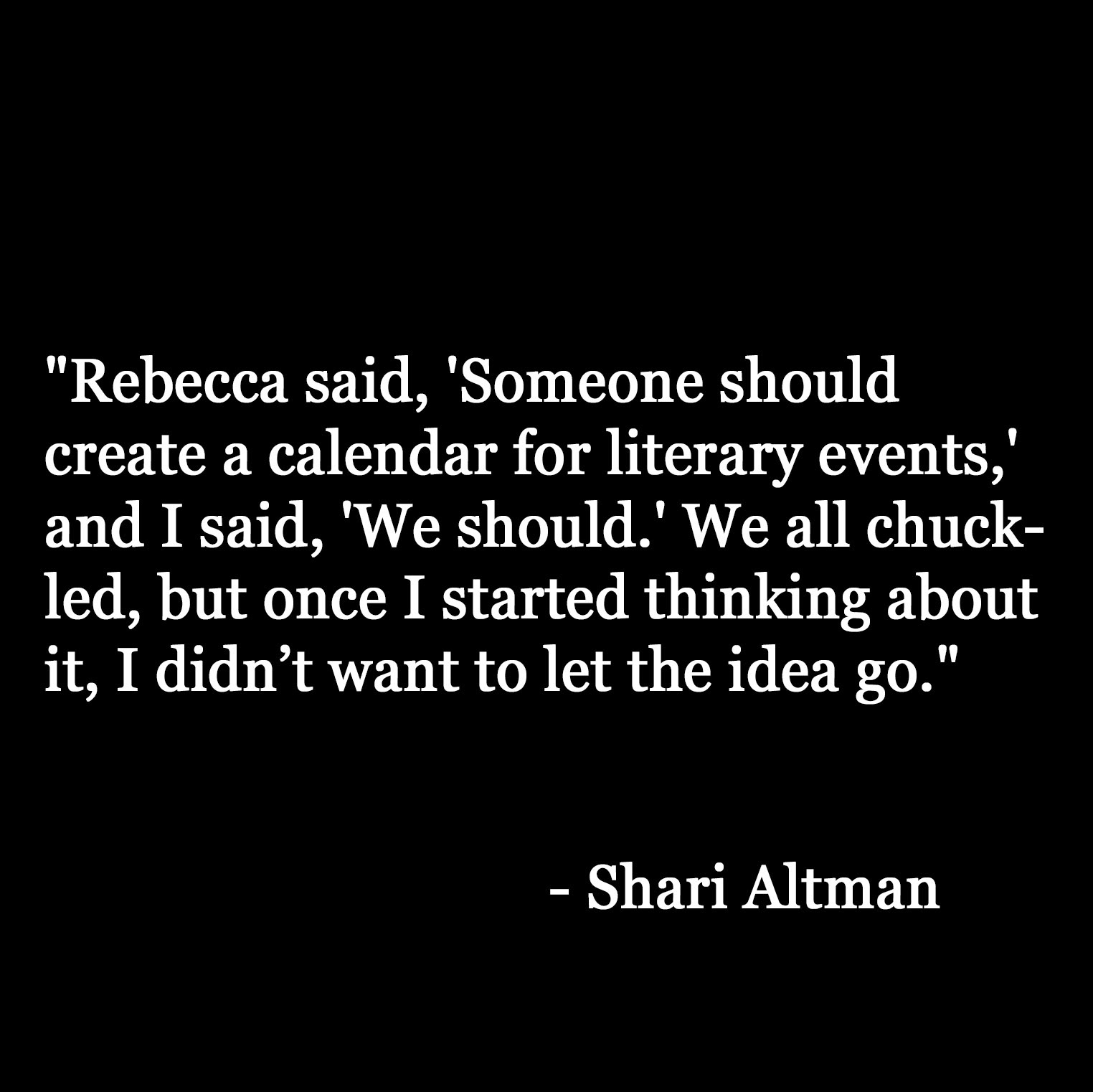
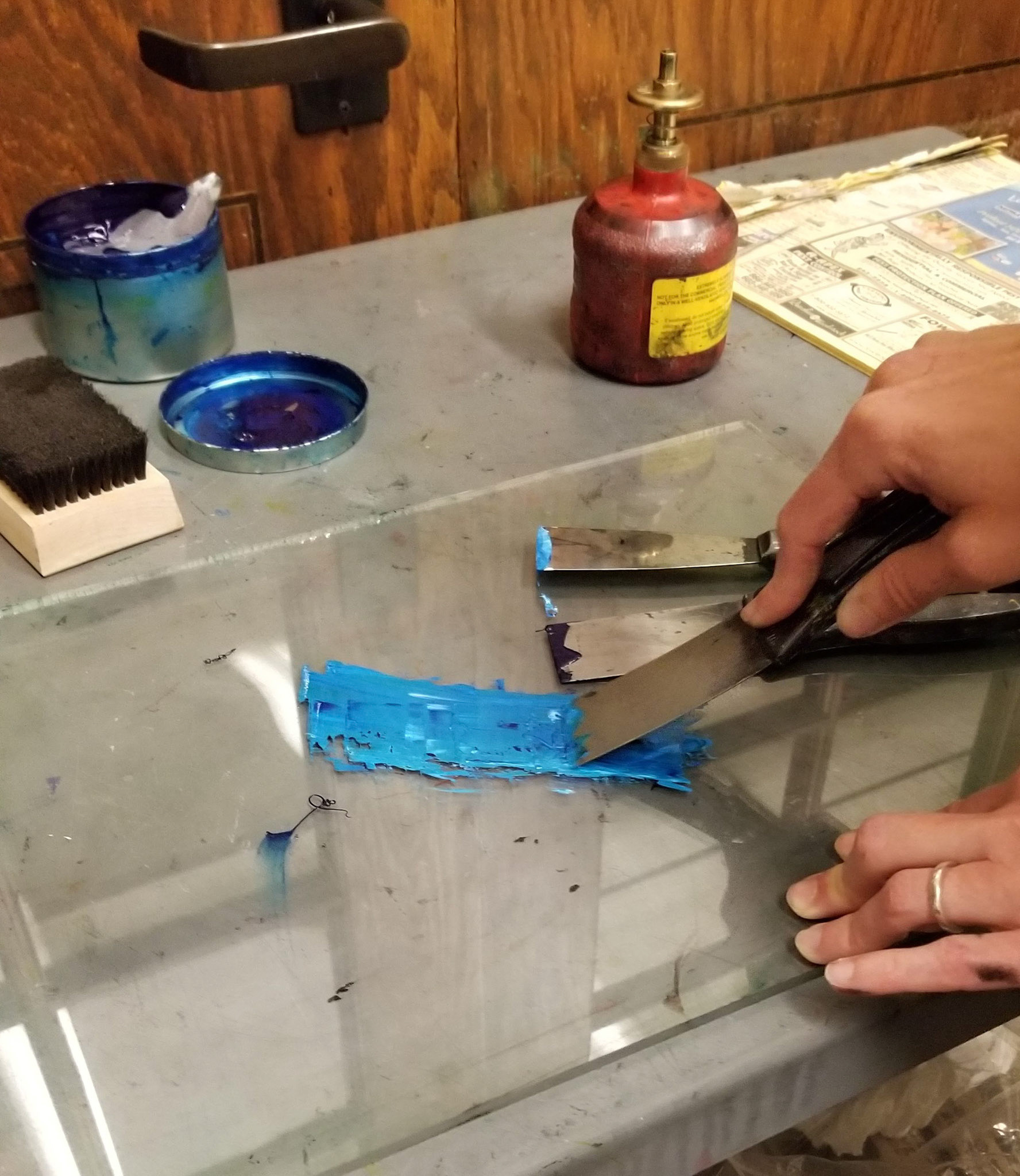
Photo courtesy of Literary North
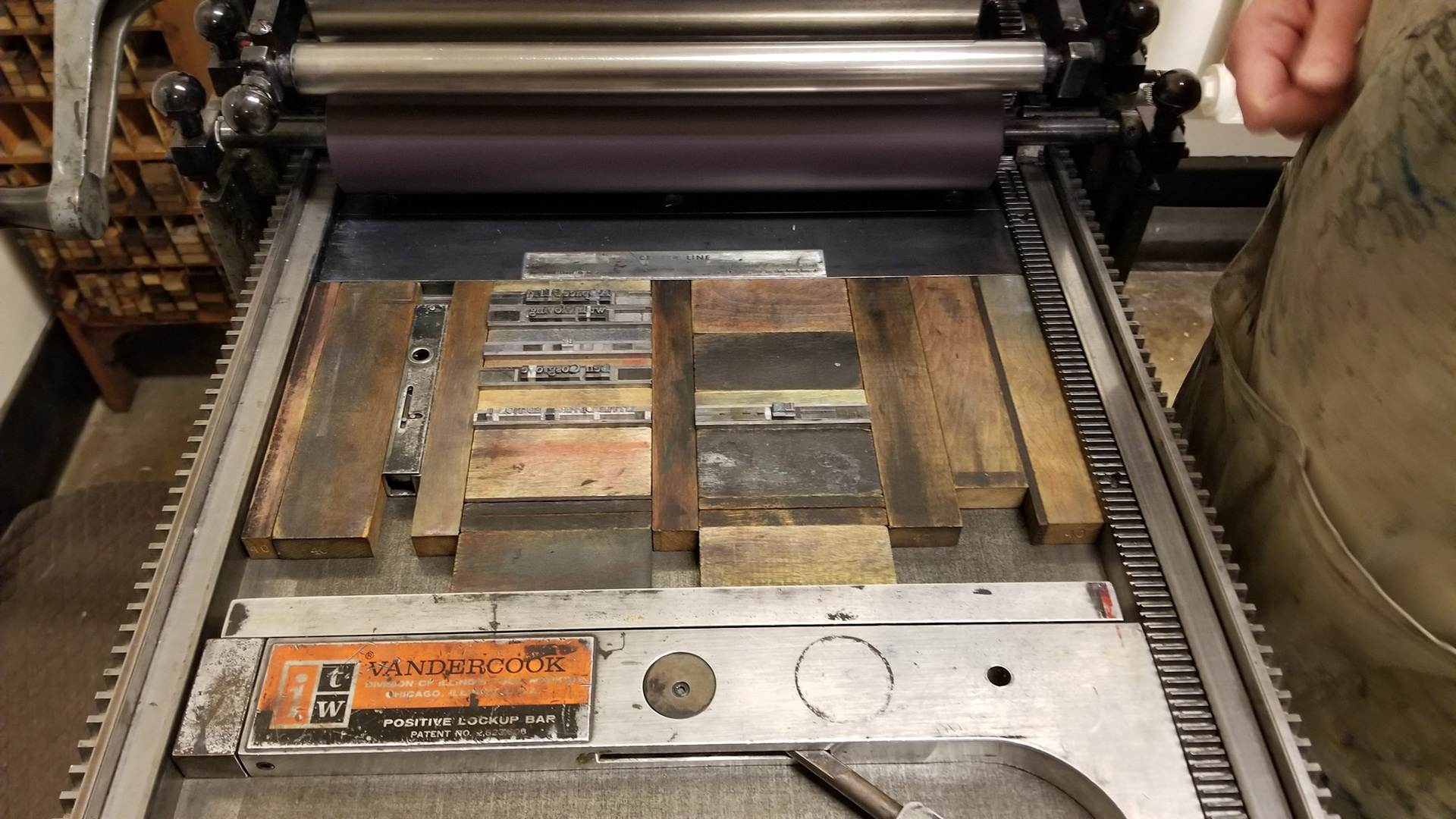
Photo courtesy of Literary North
Molly: Have you both always been voracious readers? Do you tend to have similar taste in books, or do you encourage each other to branch out?
Rebecca Siegel: When I was little, books were definitely my best friends. When I was about 10, my dad built me a little shelf to hold a tiny lamp next to my top bunk bed so I could read my huge stack of library books late into the night and not keep my little sister up. These days, I don’t read as quickly and voraciously as back then, but my house, my desk, and my bed are surrounded by stacks of books I either want to read or am in the process of reading. Our whole family is like this. I’m always a bit confused by people who don’t have piles of books in their homes.
I don’t read at the speed that Shari does, but I’m always reading—or trying to read—something. We definitely have very similar taste in books. I always trust Shari’s recommendations. Also, she’s so good about knowing what books are coming out soon and discovering books that are truly amazing. For instance, I wouldn’t have known about Ducks, Newburyport without Shari.
Shari Altman: Yes! I learned to read at an early age, and it’s been an important part of my life ever since. My family likes to tell people that I sat down at age 4 and read The Call of the Wild. While it is true that I loved the cover of that book and desperately wanted to know what was inside, I’m pretty sure I was just flipping pages and calling out a bunch of letters, asking my mom what they meant.
In terms of reading tastes, we definitely overlap. We both like poetry, translated literature, and nonfiction. We sometimes trade books back and forth. I’m confident that if Rebecca recommends a book to me, I will like it. Perhaps I read more contemporary literary fiction than she does? I do enjoy looking through the publishing catalogs and seeing which books catch my eye for the upcoming season, though it probably leads to me buying more books than I should!
Molly: How did you first meet, and how did you decide to take the plunge and launch Literary North together?
Shari: We met through our mutual friend Beth, another book lover. We all attended a Zadie Smith reading at Dartmouth and wound up sitting at the bar at Pine afterwards talking about how we almost missed the reading. I happened upon the Dartmouth announcement of her reading when I was doing a Google search to see when her next book was going to be released in the US. It seemed so random. I definitely wouldn’t have known about the reading otherwise. Rebecca said, “Someone should create a calendar for literary events,” and I said, “We should.” We all chuckled, but once I started thinking about it, I didn’t want to let the idea go.
I also want to thank [Junction founder] James Napoli for co-sponsoring and helping promote our first event, the Mud Season Salon. I truly think he helped us find an audience. We are forever grateful!
Rebecca: I like to say that Literary North was born over a shared plate of buffalo cauliflower!
Molly: I’d love nothing more than to have conducted this interview over drinks and buffalo cauliflower at Pine!
Starting your own publishing project is another huge step. What made you delve into that work? What voices are you hoping to create a platform for, and what role do you see your publication playing in the northern New England literary community?
Shari: From the very beginning, we’ve had a list of ideas for Literary North of things we’d eventually like to do. One idea we both felt passionate about was publishing our own chapbooks. At the time, it seemed like chapbooks would be far out into our future. We can’t believe that we’ve already created two with a third on the way.
In regards to the Little Dippers, I think quite simply that we want to share work that we love. We’ve met so many amazing, creative individuals through Literary North, and we want to share their work with the broader community. We are looking for work that surprises us, inspires us, moves us, changes us in some way.
Rebecca: I’ve been into paper arts for a long time. I used to make my own paper, and I do origami as a sort of meditation. I’ve been intrigued by the printing process ever since I visited the Chicago Tribune newspaper printing plant on a field trip when I was a kid. A few years ago, I finally took a letterpress printing class and I was hooked. I took more classes and then finally got in touch with Sarah Smith at Dartmouth’s Book Arts Workshop. Combining my love of printing and Literary North’s mission of fostering a local literary community seemed like a natural fit.
For the Little Dippers, we wanted to create tiny, beautiful books that would help share the work of New England writers that people may not be aware of already. These are people who have beautiful work and are often already published but are not yet widely known. We think they ought to be. We also look for work that really inspires us. These books take a lot of work to make, so we choose writers and writing that we love spending time with.
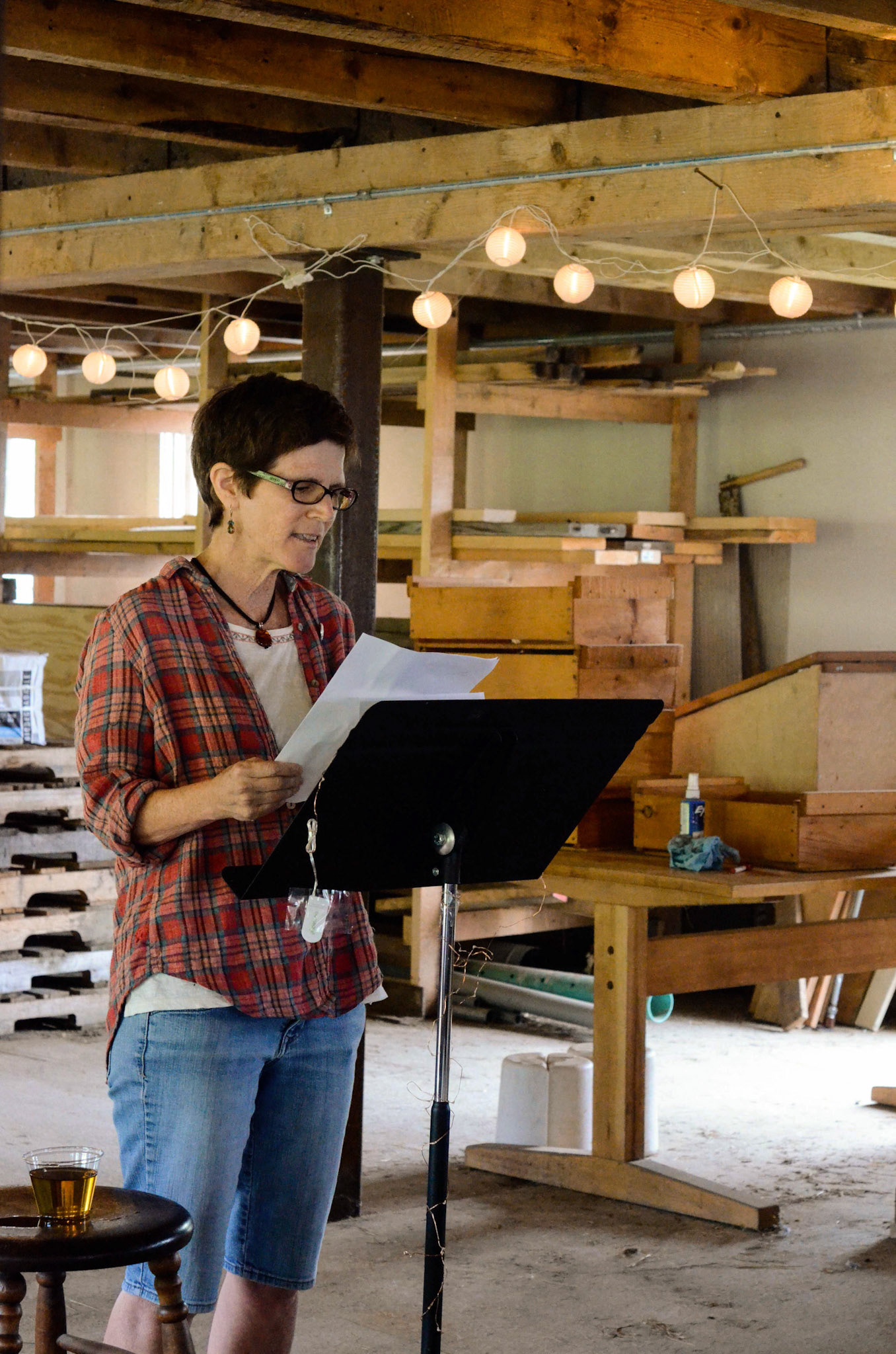
Mary Kane. Photo courtesy of Literary North
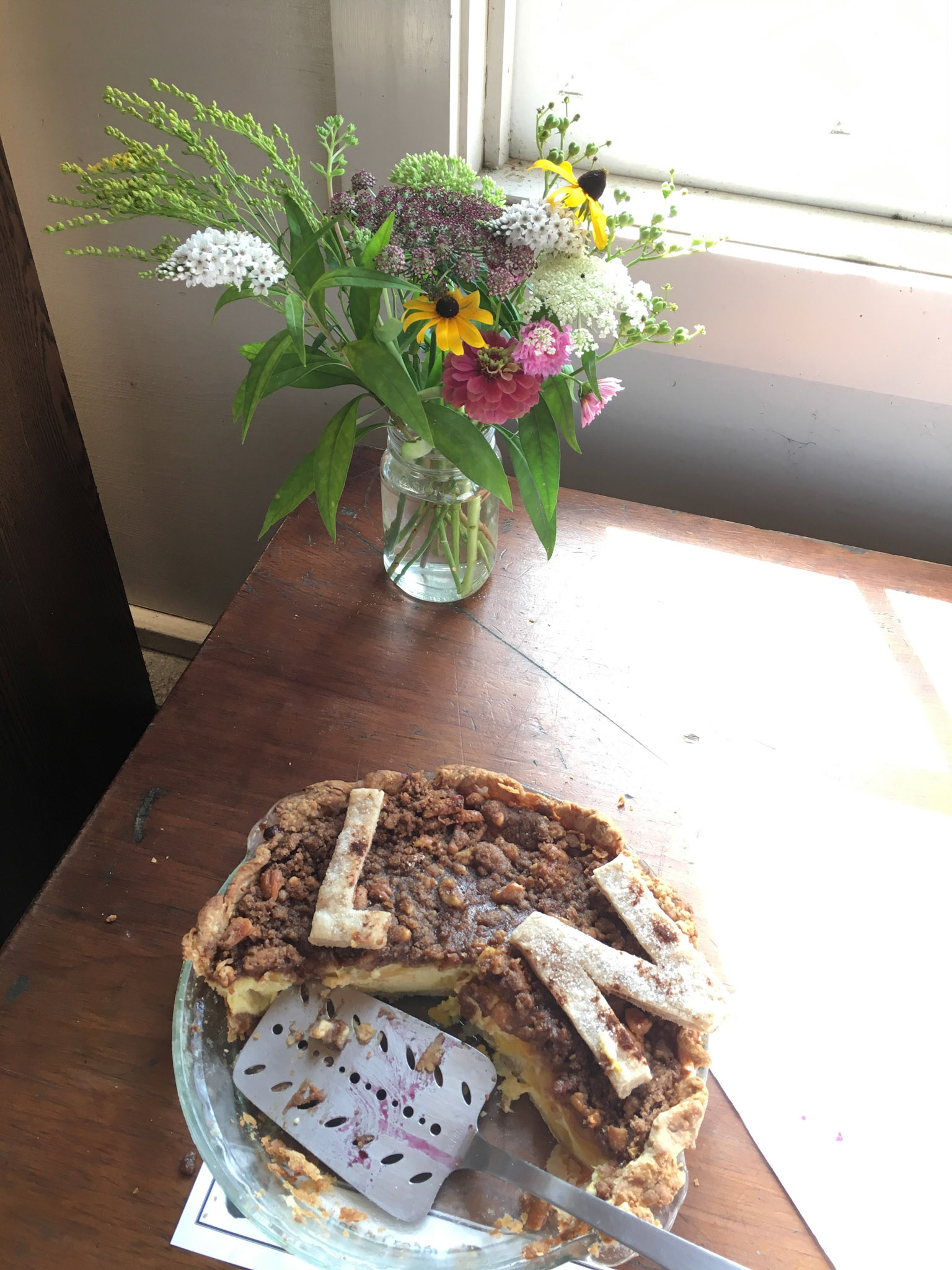
Photo courtesy of Literary North
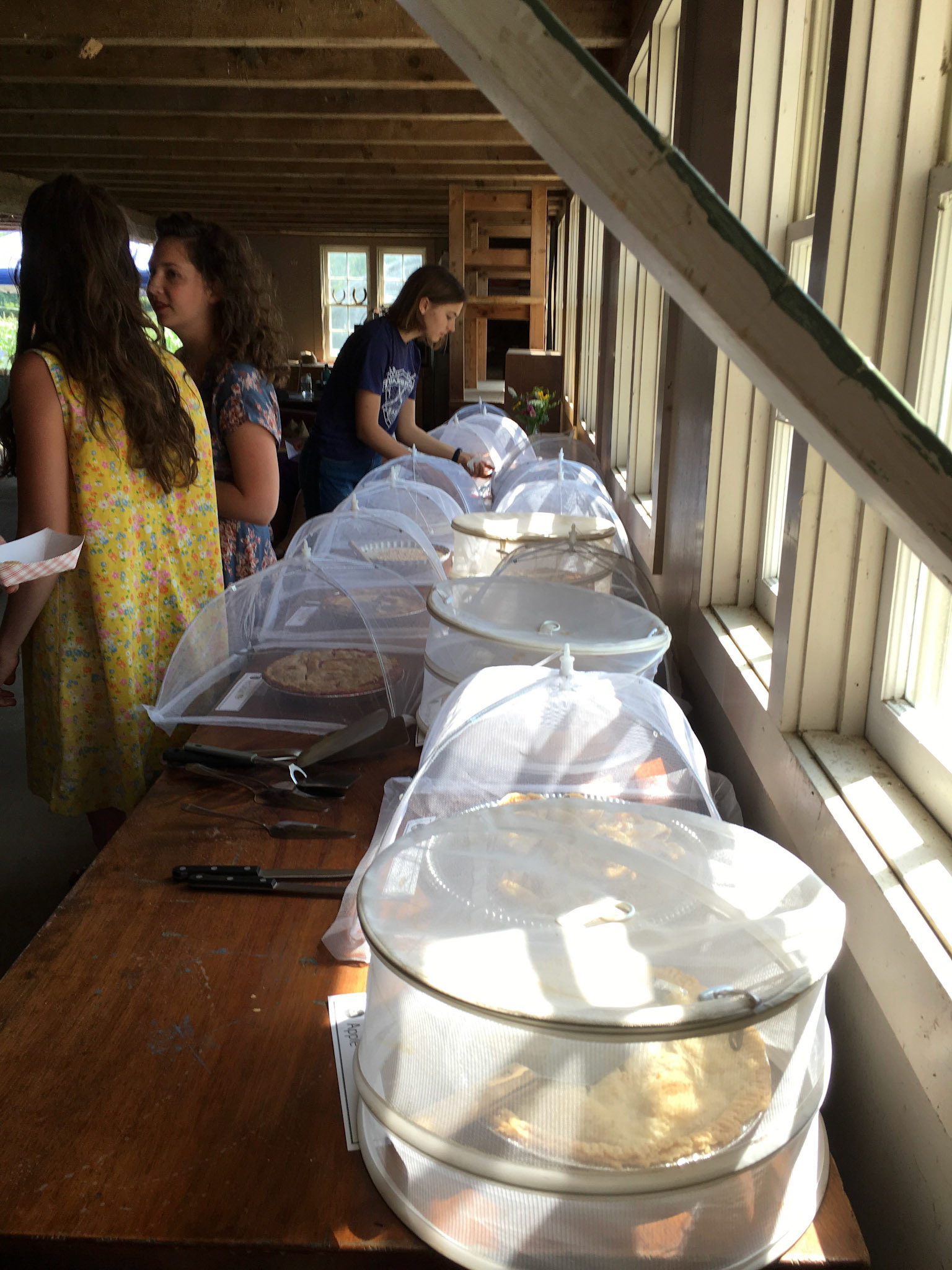
Photo courtesy of Literary North
Molly: Mary Kane's On Tuesday, Elizabeth is the third chapbook in the series. How distinct has the process felt with each author? Editing poetry, nonfiction, and short fiction has to be wildly different each time.
Rebecca: Yes! All three books have been really different. A different process, a different feel. After we finished Rena Mosteirin’s book, Half-Fabulous Whales, I naively thought we had the process more or less nailed and the rest would follow that model. In some respects that’s been true, but, really, each book is its own distinct being with its own problems in editing or layout, or, in the case of Mary’s book, production during a pandemic. Also, of course, each author is different. We love to let the authors have as much control as they like in the process, including selecting the pieces to include, helping us do the printing, choosing the thread/ ink color, etc. Some authors are very hands-on, and others like us to make the decisions. We really like how individual each project feels, and yet that they stand together as a set.
Shari: I agree. I think that each project is different. We just really want the writers to be happy with the final product.
Rena already had a grouping of poems that she was interested in using, and we just helped her narrow it down. I remember sending Rena photos of us in the Dartmouth Book Arts Studio setting the type for her Little Dipper. It was exciting—our very first chapbook! Half-Fabulous Whales will always hold a special place in our hearts.
For Ben Cosgrove’s book, we asked him to send a few essays our way and when we fell in love with one, we asked him if he was open to having the piece edited to fit the chapbook size. He ended up coming to Book Arts with us when we set the type for his book and was able to help us create the color ink he wanted for the cover, which was so fun.
And then Mary, Rebecca, and I talked about what we wanted for her book. She’s an equally fabulous poet, but we are just smitten with her short stories. She let us choose the stories we wanted for Little Dipper III. When we needed to cut one or two due to space concerns, she helped us in that process.
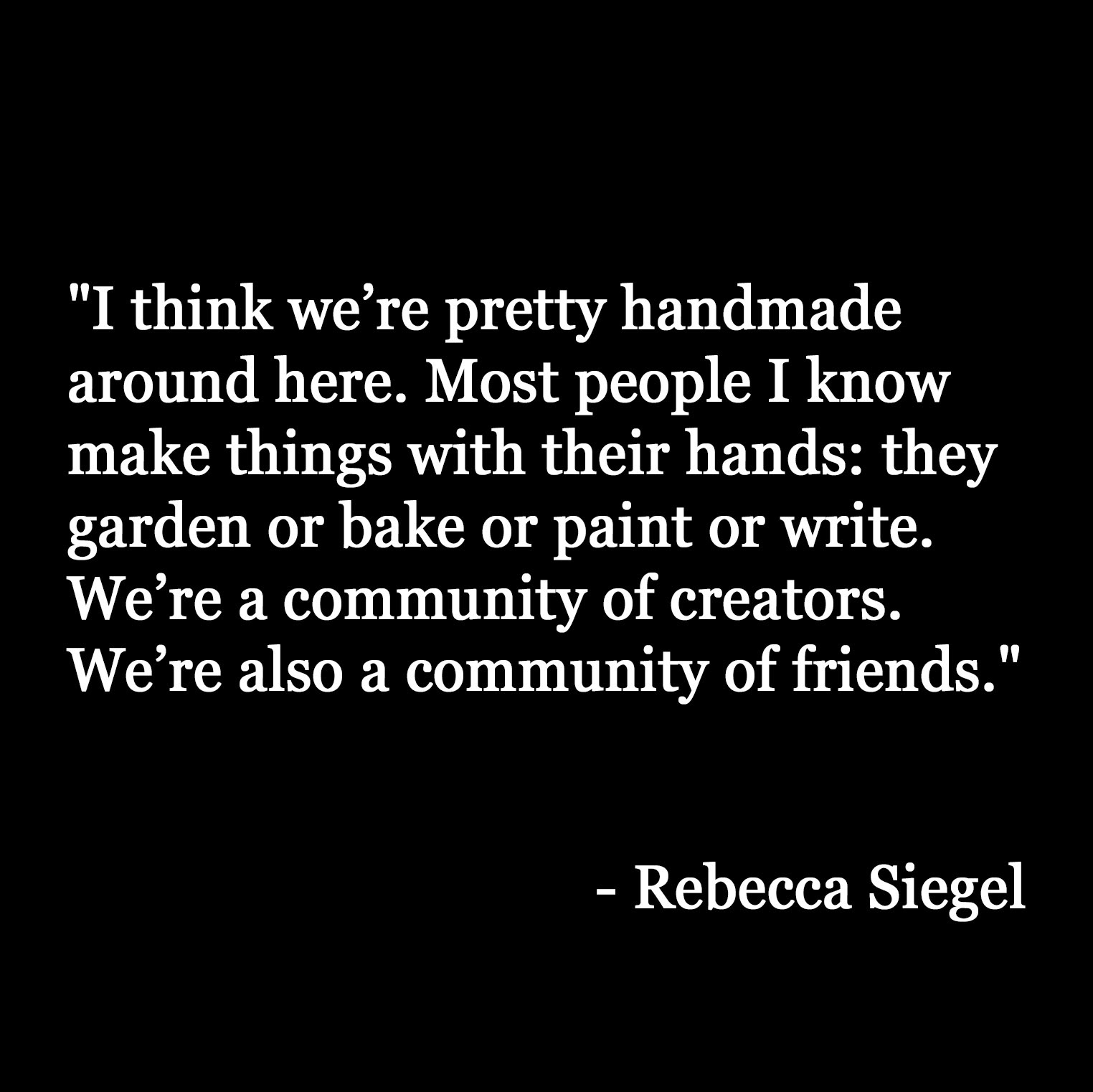
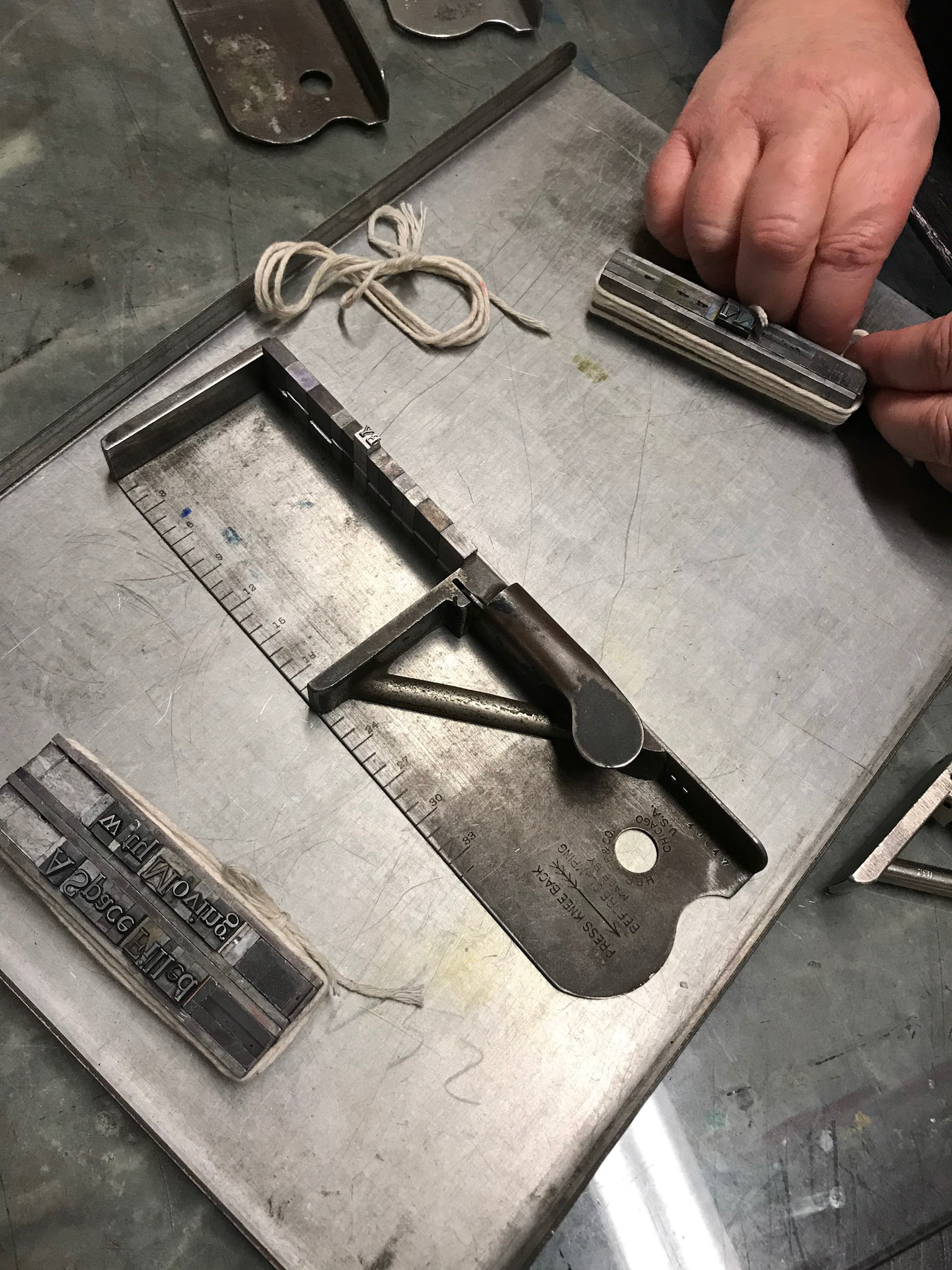
Photo courtesy of Literary North
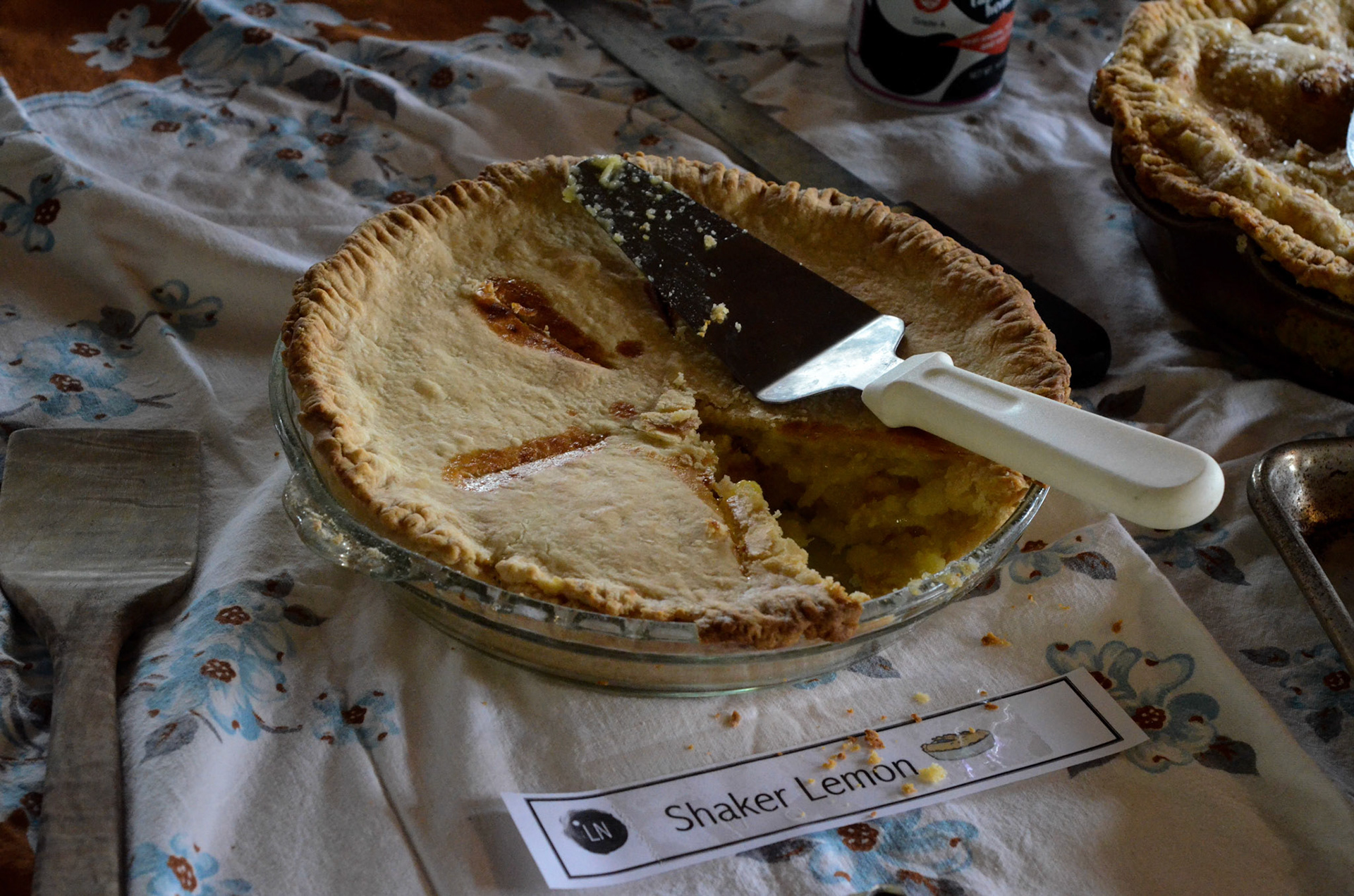
Photo courtesy of Literary North
Molly: What are you each big sticklers for as editors? Who's a tireless advocate for the Oxford comma, and who can't stand split infinitives?
Shari: I defer all editing questions to Rebecca. She’s our in-house editor, and she’s amazing. I have very little, if anything, to do with the editing aspect of Literary North.
Rebecca: I’m totally fine with split infinitives, but, yes, I insist on the Oxford comma. I guess I do the bulk of the editing work, but Shari definitely backs me up. I’m my own worst copy editor (as a glance at any of my emails demonstrates), so I really rely on Shari to catch my mistakes.
I enjoy substantive editing: looking at pieces as a whole and trying to figure out the best way to present the writing. As Shari mentioned earlier, Ben’s book took a lot of this type of editing. The original essay was gorgeous, but it was about twice as long as we could fit. Editing it down took a lot more work than just chopping out 5,000 words. It was really fun finding the threads through the essay and then figuring out what seemed essential and what might be tangential enough to go, or tangential yet still necessary.
Molly: Ha, I think it’s universally true that we are all our own worst copy editors — sometimes I even make things worse for myself in the second pass. And yes, copy editing and substantive and developmental editing are distinct skill sets.
I once worked for a curator who was able to sit down and write entire chapters longhand, practically in a single sitting. I was fresh out of grad school, and working on that book with him was a fascinating glimpse into just how different everyone’s approach to writing and revision can be; it made me wonder how much the way I shape and reshape my own research projects is informed by having grown up on a computer.
Rebecca: I think that’s a great question to ask ourselves. I learned to write before computers were a thing everyone had, but was one of the few kids in my dorm with a personal computer in school. Over the years, I’ve transitioned from being a mostly writing-on-paper person to a mostly writing-on-computer person and I really do wonder how that has affected my writing. I do know that my editing is much better when I do it on paper. I keep meaning to find out if my writing will improve if I at least begin on paper!
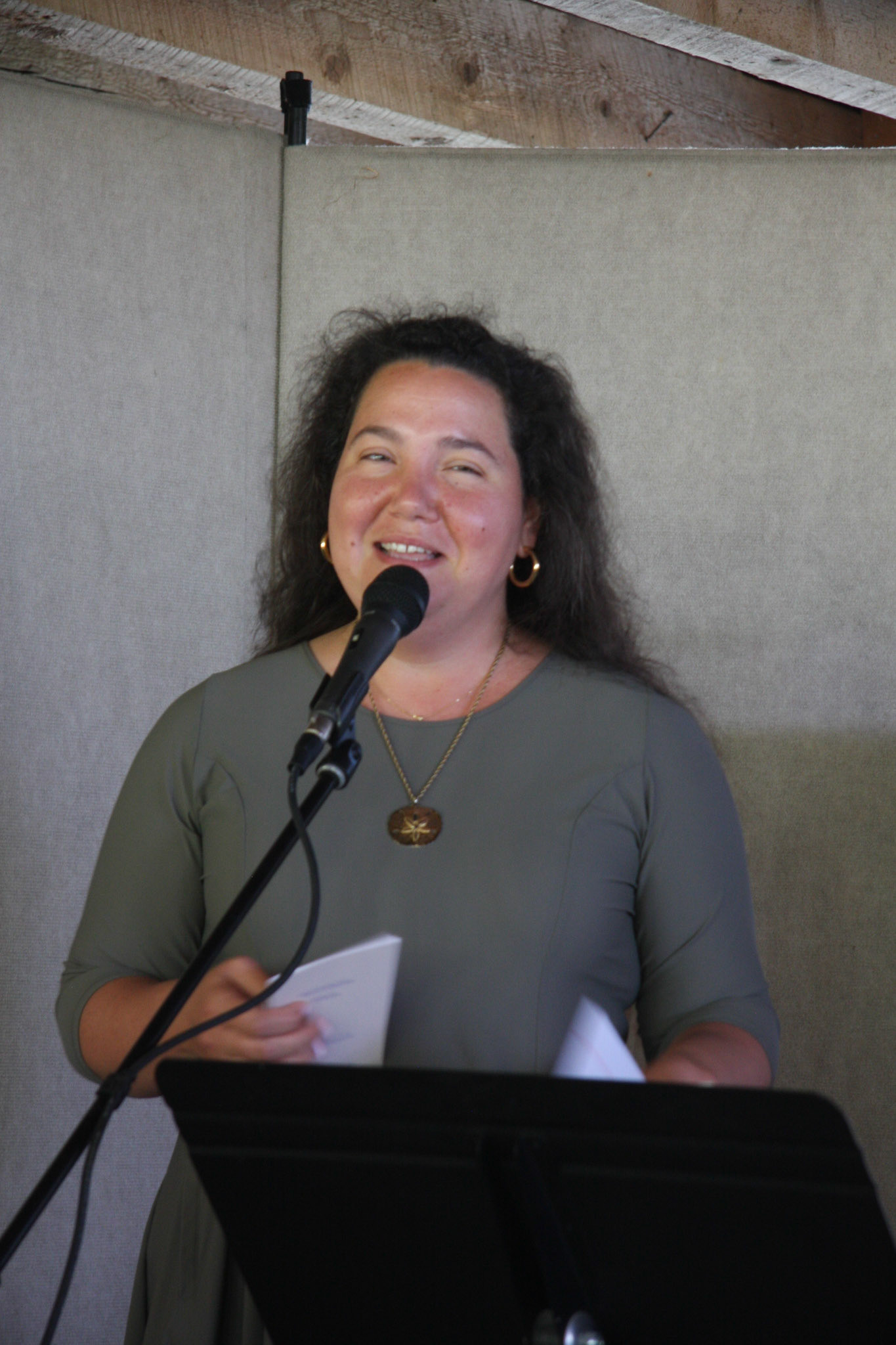
Rena Mosteirin. Photo courtesy of Literary North
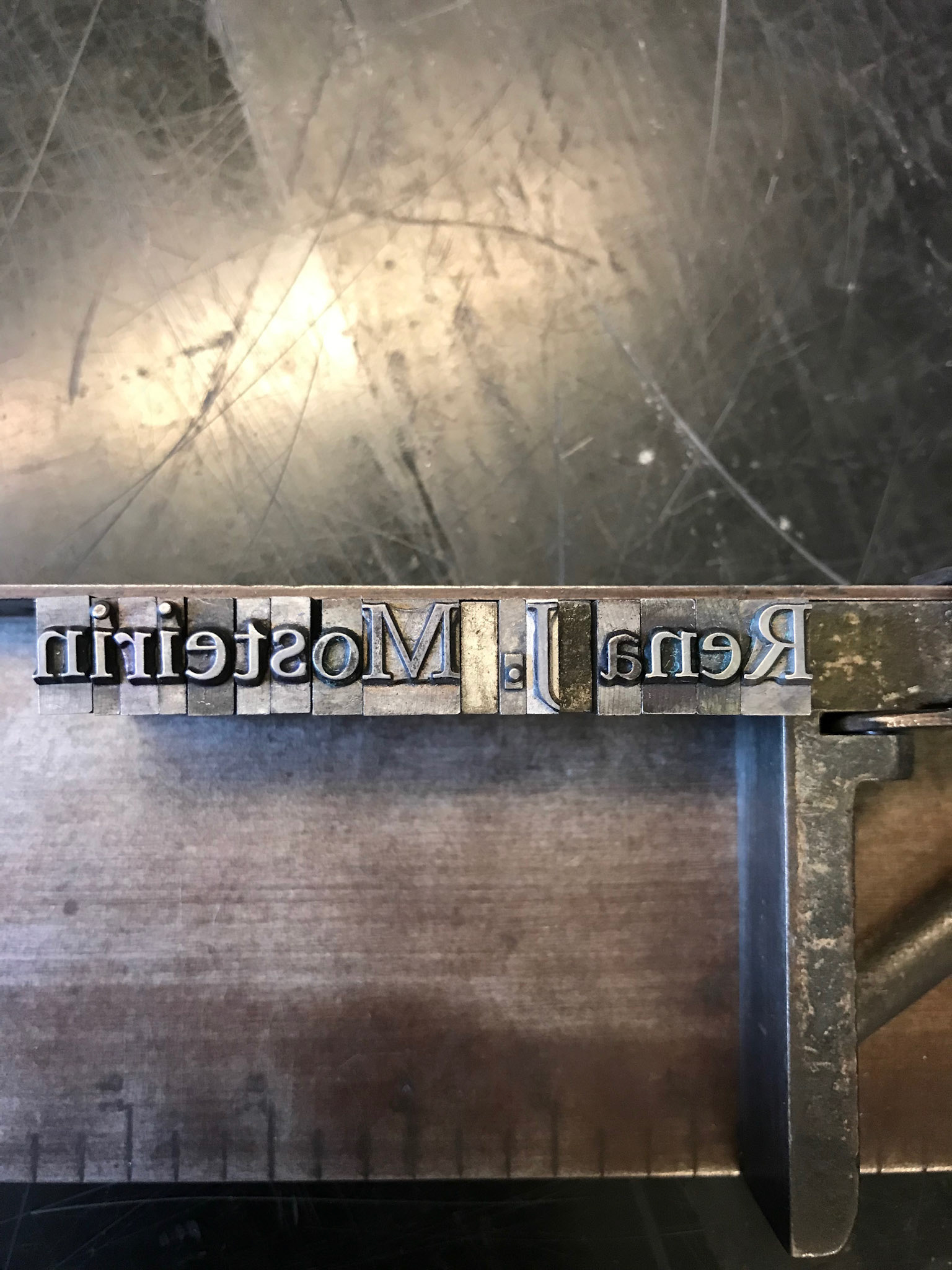
Photo courtesy of Literary North
Molly: What’s your favorite thing to discover about a writer? I’m a sucker for opening lines and almost always flip back to the first page of a book once I’ve finished it; it's kind of like going back to the first track of a really incredible album once you understand the shape of the thing. I revisited Annie Dillard when the pandemic first started, and she’s a great example because she is full-on Annie Dillard from page one, bloody paw prints as rose blossoms and all.
Shari: I think we both love looking for an author’s favorite words or images, particularly in a poetry collection. I’m also interested in endings. Where did the writer choose to end the piece/book/collection and how did this ending make me feel?
Rebecca: I love that you mentioned Annie Dillard and I totally agree with what you said about her: full-on. I love seeing the obsessions of a writer, the things that repeat (even literally: I love repetition in writing and in music). I agree with Shari about endings. I think I’m pretty much obsessed with endings. As a poet, I feel all my own work is focused on making the ending feel exactly right, but with a light touch. I don’t want you to see where I’m headed, but I want the ending to feel like it couldn’t be anything else. It’s impossibly hard to do well. So I adore writers who know how to stick that kind of landing. Short story writers are particularly good at it. Peter Orner, for example, is a genius at writing endings that sort of just float there and give you shivers.
Molly: You'd both be right at home as early modern scholars working with a concordance (I’m a hopeless nerd for Shakespeare's). And I agree that short story writers — though I’d also include playwrights! — are particularly adept at sticking that (often pretty devastating) landing.
Have you gained a new perspective as writers having gone through this process as editors and publishers three times now?
Rebecca: I definitely have. As an editor, I’m always trying to let the writers know how much I love their work and respect their feelings about it. I always want them to know that our goal is to create a book that they love as much as we do, and that their love of the book is pretty much the most important part of the project. I feel protective of their work and want it to sing and dazzle (gently or blazingly, depending on the work). In the case of Mary’s book, her stories are so gorgeous and quiet, very interior. Mary herself is shy and not one to brag about her work. I want to do that for her. To shout her brilliance to the roof tops. In my own writing, I’m just as shy. So I like knowing that there are editors out there who treat my work similarly, help me bring out the best in my own writing, and help me be a bit shouty about it when I’d rather hide in the background. Writers and editors can be wonderful partners when the relationship is good, supportive, and honest.
Molly: I’m sure it’s incredibly reassuring for your authors to work with someone who’s been on the other side of the table and empathizes with — and is even protective of — that process and partnership. I should also say that Rena speaks very highly of your poetry, and reminded me of your Pushcart Prize nomination for “One Sunday in March.” Congratulations again!
Can you talk about the book making process? How does the design come together? What's it like to dig into that work in Dartmouth's Book Arts Studio? I can’t overstate how beautiful these books are as objects, too.
Rebecca: We adore being in the Book Arts Studio. We feel so lucky that this resource is available to the Upper Valley community. And Sarah Smith is just incredible. Her knowledge about printing is vast, and her sense of humor and generosity (and patience in teaching us) seem bottomless.
To design the text of the book, we work with my friend Jane Steger-Lewis, who lives in an old, rambling house on the western coast of Ireland. She and I met via Twitter and have been virtual friends for years. Early in the process of doing Rena’s book, I was trying to find a free or open-source layout program because I didn’t want to buy a copy of InDesign. I asked Jane for advice because I knew she had a background in layout and design. She immediately offered to do the layout work for us and we’re forever grateful for her offer and her expertise.
The design process with Jane is iterative because each book has been so different and we’re still learning how many words will fit in the number of pages we have. A collection of poems, an essay, and a collection of short stories each have their own requirements for layout in terms of white space and flow. So we sort of start from the beginning with each book. I hope it gets a bit easier when we do the next one, but it all depends on the content, I suppose. Jane is a dream to work with. She has a great eye and has made many good suggestions for layout. And she’s also a terrific artist in her own right. She drew the whale image for Rena’s book, and the cabinet image for Mary’s.
Shari: Book Arts is our happy place. We miss working there and hopefully will be able to visit again in the fall. Sarah and the student volunteers have been so kind and welcoming to us. We feel beyond lucky that this resource is available to us in the Upper Valley. I think it’s true to say that without Dartmouth Book Arts there would be no Little Dippers!
Molly: In that way, do you consider the Little Dippers a product of the Upper Valley?Rebecca: I think we’re pretty handmade around here. Most people I know make things with their hands: they garden or bake or paint or write. We’re a community of creators. We’re also a community of friends. It’s a small area and you’re always bound to meet someone you know grocery shopping or running errands (even with masks on, we recognize each other and wave). To me, the important thing about the Little Dippers is that they are handmade and arise out of that feeling of community. The authors are part of our Literary North community, dear friends either before or because of Literary North. The people who help us make the books—Jane, Sarah, and others—are part of the community, too, in person and virtually. Also, it was Rena who suggested making her book available as a free digital download and we just loved that. To be able to share all this hard work with whoever wants it, that’s a real treat. It makes the community that much larger.
Shari: The Little Dippers are a product of the Upper Valley in that we live here, work here, make the chapbooks here, but to me, they don’t feel specifically of the Upper Valley. Instead, I feel like they are part of our personal extended literary community. Books Arts is definitely part of that community as is our friend Jane, who designs the layout but lives in Ireland. Mary Kane (Little Dipper III) lives in Massachusetts. Ben travels all over the country. We’ve met so many wonderful individuals both personally and through our work with Literary North. We want to celebrate these creatives and make a beautiful object to share with others.
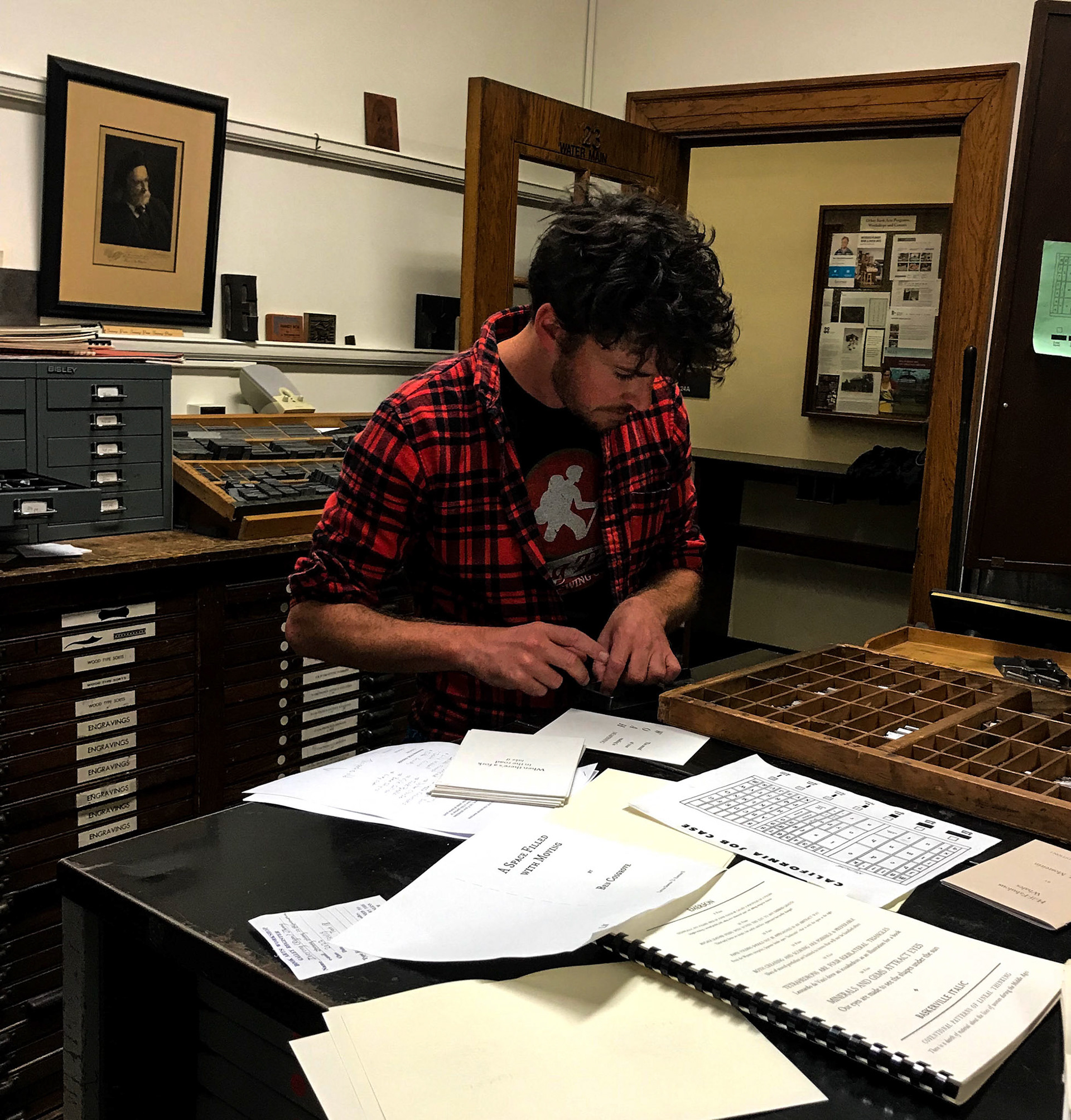
Ben Cosgrove. Photo courtesy of Literary North
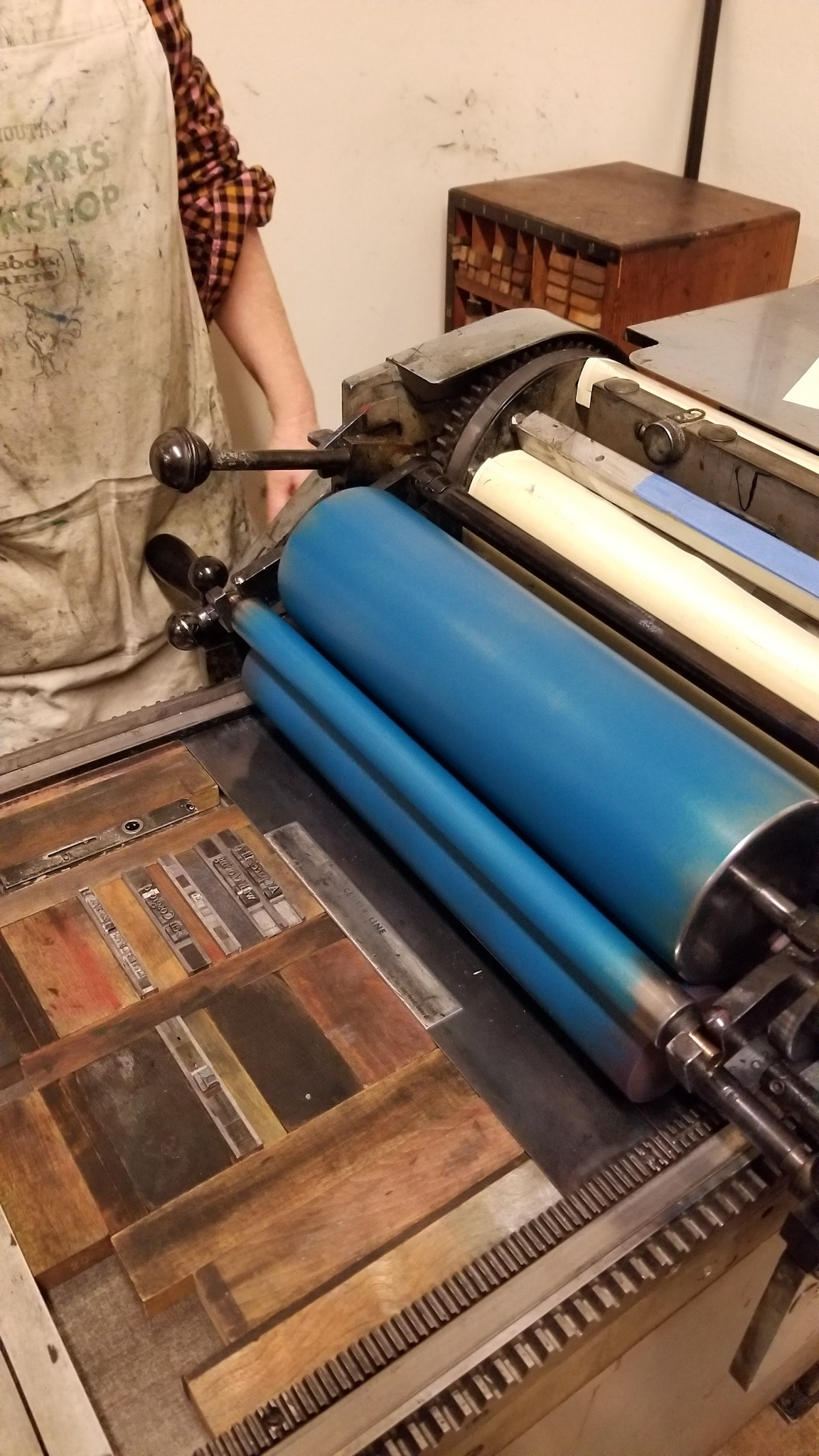
Photo courtesy of Literary North
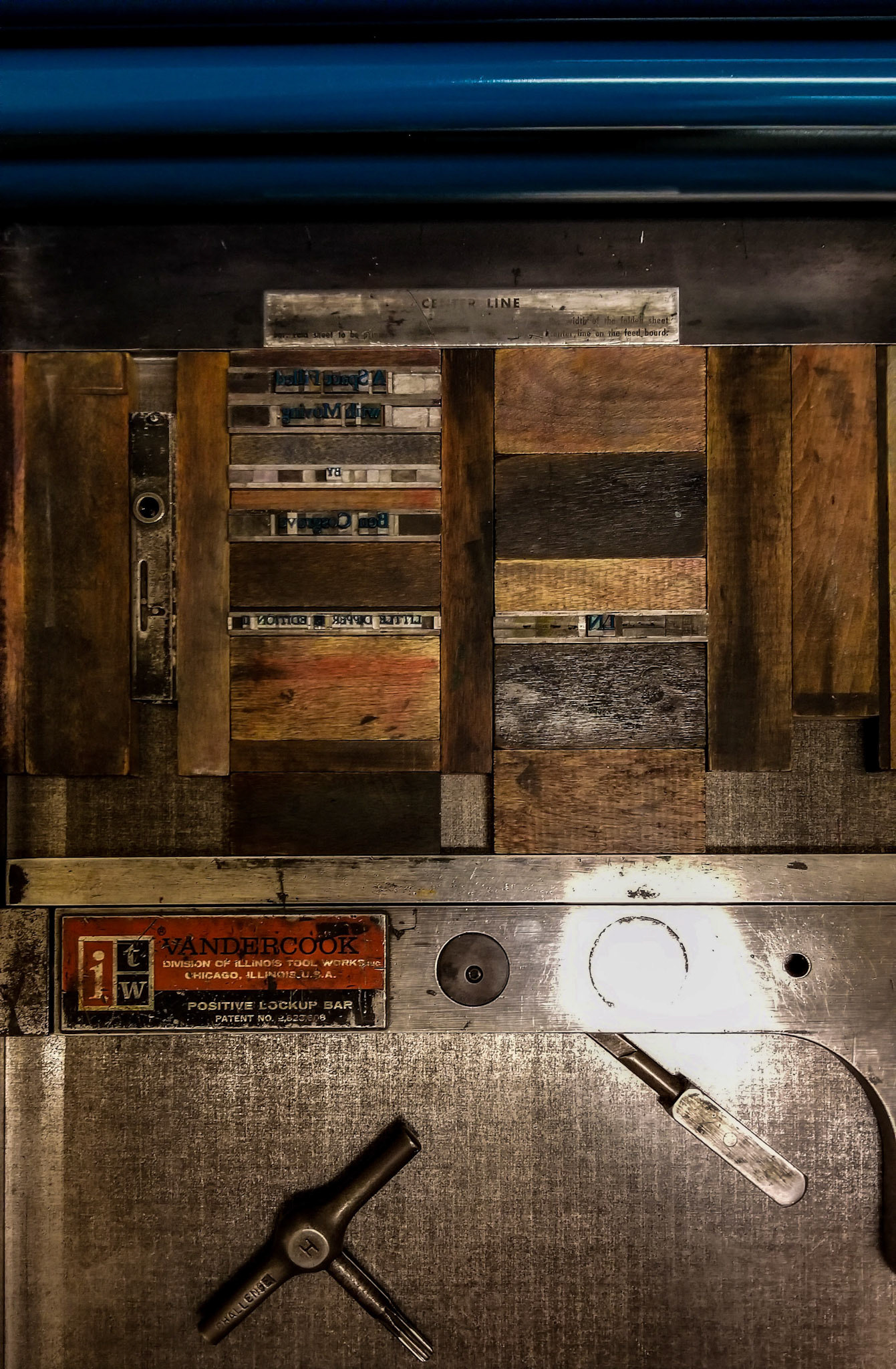
Photo courtesy of Literary North
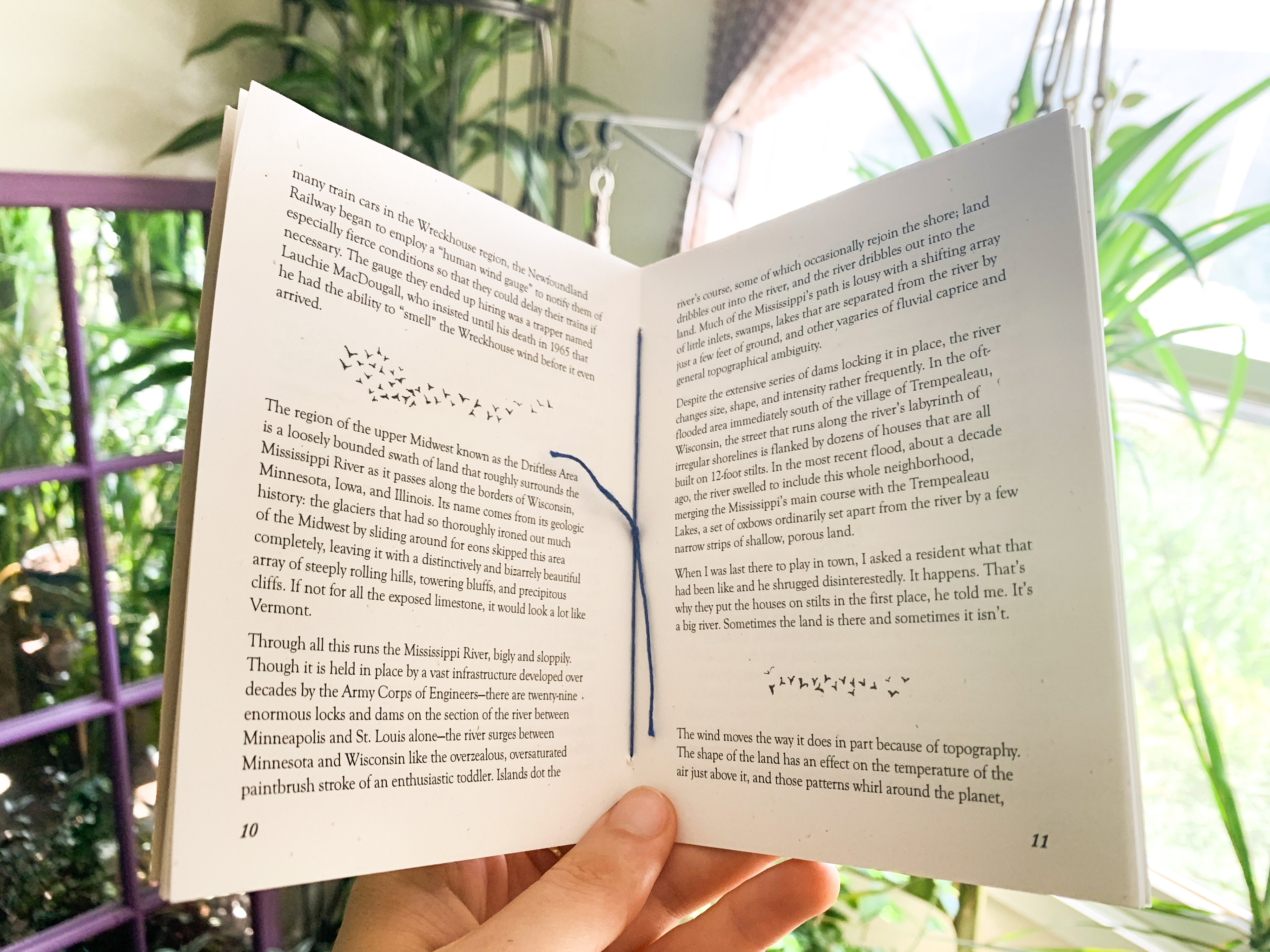
Photo courtesy of Molly Papows
Molly: What's proven to be the biggest learning curve?
Shari: We launched our first Little Dipper at Poetry & Pie, which made the process very natural, but for our second book, we offered pre-orders and shipping without really thinking that process through. We’ve since decided that we don’t want to do mail order going forward.
Rebecca: I’ll second that. We had no clue what we were doing when we agreed to mail books around the country. Lesson learned. For me, the biggest learning curve has been figuring out how long a piece we can fit in the size of the book we chose. Every time I feel like I have a handle on how many words we can fit, I’m proven wrong because each piece feels unique with its own layout requirements. But I think we’ll get the hang of this as we get more experience. The other thing I feel like I’m still learning is how to get the cover type set up on the press efficiently. We know how to do it, but we’re slow at it because we don’t do it often enough to get really experienced.
Molly: What's next?
Shari: We’re focusing on a few virtual events with authors in August and October, and we hope to make it back to Book Arts in the fall to letterpress the covers for Mary’s chapbook. Otherwise, we’re continuing to put out our newsletter, The Dipper, on the first of each month. We pack this newsletter full of calendar highlights, new releases, submission dates, upcoming workshops, and even include a few recent podcast episodes that we’ve loved. We’re also working daily behind the scenes to add entries to our literary calendar of events that we compile for Vermont and New Hampshire. An endless task. One of our favorite parts of running LN is collaborating with arts organizations/bookstores, so if you have an idea, email us!
Rebecca: We’re pretty eclectic in our project choices. Also, we follow our whims—something that’s easy to do when it’s an organization of just two—so what’s next is hard to know. We recently completed an online community writing project (Constellation: Ekphrasis), which was something I wanted to do from the start. I’d like to do another. And maybe some time create a printed zine or other collection of community writing. For now, though, we’re focused on finishing Mary’s book, and the upcoming virtual events Shari mentioned. And, of course, we’re already working on next summer’s Poetry & Pie event, which we hope will make up for our not being able to have it this year.
Poetry & Pie (for those who haven’t attended) is our annual celebration of local poets. We usually participate in several events every year, but P&P has sort of become our signature event. We usually invite three poets to read, invite the audience to ask questions, and then open the floor to a community open mic. We and our friends bake loads of pies of all sorts and fill tables with them. For the past three years, we’ve held the event in the big, working barn at Sweetland Farm in Norwich, VT. The setting is idyllic. The barn is full of farm tools and swallows flying in and out. People are eating pie and kids are roaming around. The poets seem to love it, too. They feel relaxed in this setting. There’s a lot of laughter, and a whole lot of appreciation for poetry. It’s really wonderful.
July 2020
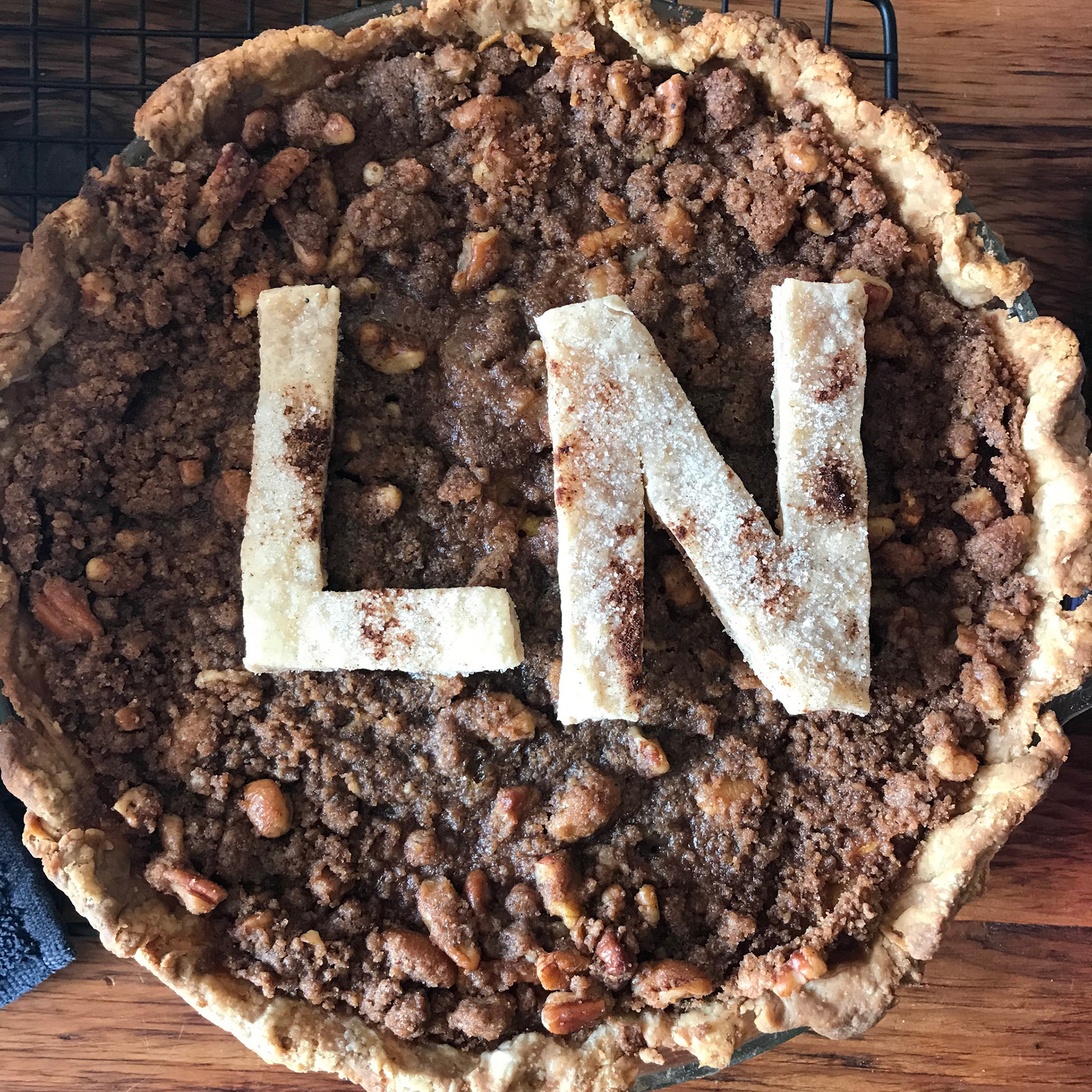
Photo courtesy of Literary North
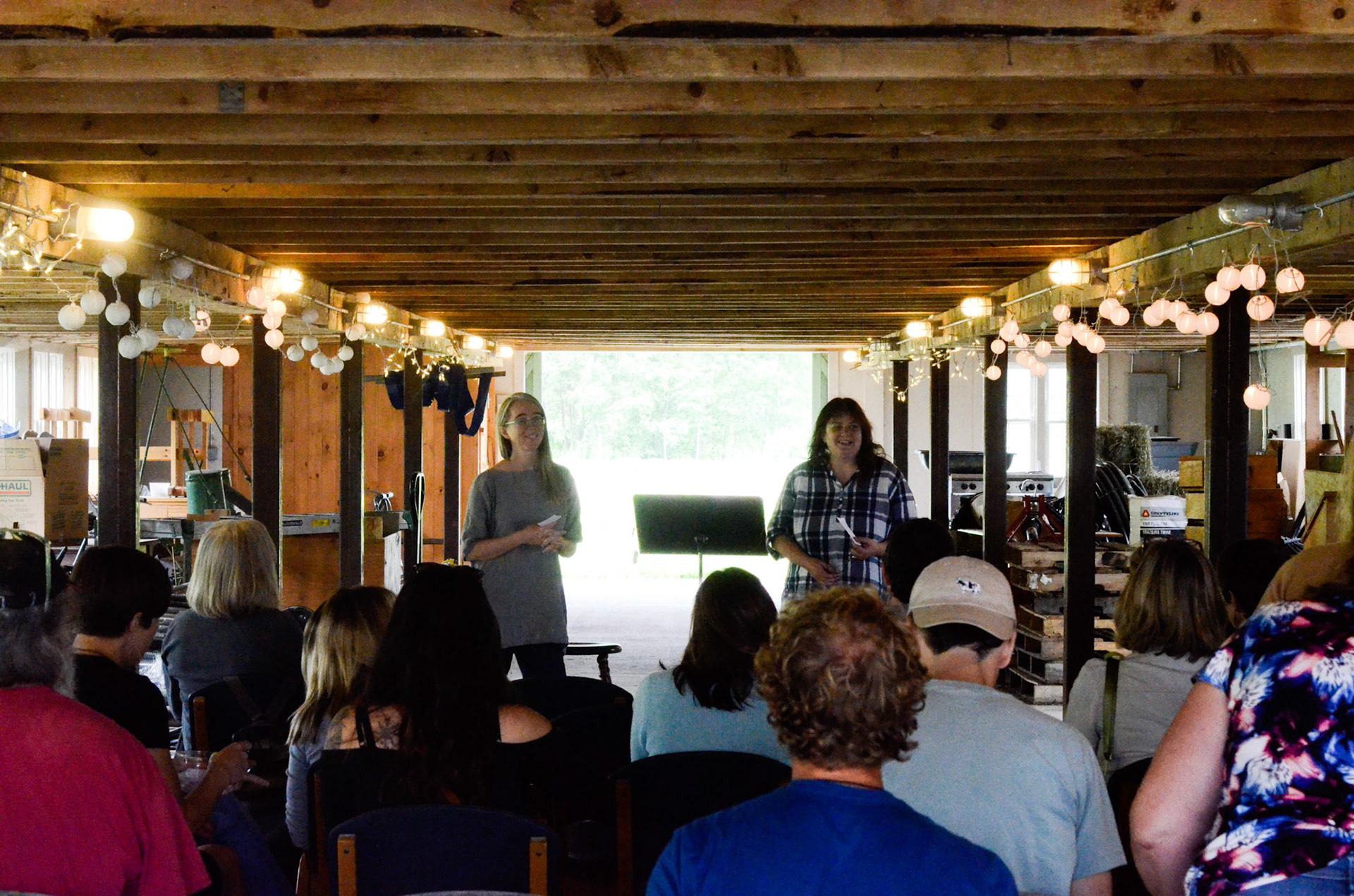
Shari Altman and Rebecca Siegel. Photo courtesy of Literary North
Though it comes as no big surprise, Shari Altman graduated with an English degree but has since worked in education and agriculture. She currently works as an administrative assistant in health care and lives in Vermont with her husband, cats, chickens, and bees. When she’s not reading or working on Literary North projects, she enjoys gardening, DJing for her bimonthly radio show, and exploring the wilds of nature.
Rebecca Siegel (also an English major) is a writer, reader, picture taker, bread baker, and goat wrangler. By day she’s a digital content producer for a local hospital’s website. At night she writes poems and takes a lot of pictures of the moon. She lives with her husband and daughter in Thetford, Vermont.
Molly Papows (another English major!) is an art historian based in Lebanon, NH. She has an MA in the History of Art and Architecture from Boston University and ten years of experience working in encyclopedic fine art museums. She’s also interested in the many ways an artist can tell a story across disciplines — from fiction and nonfiction to poetry, landscape architecture, and music.
